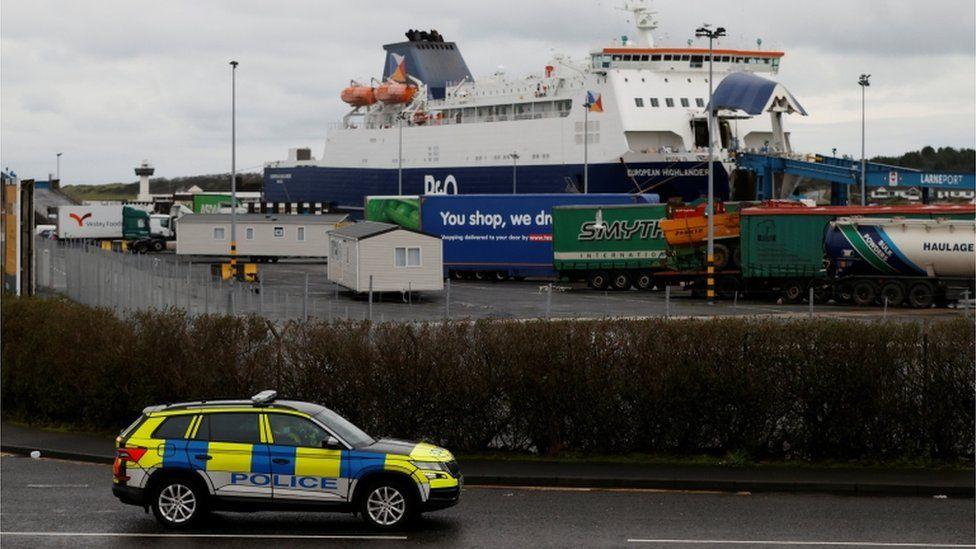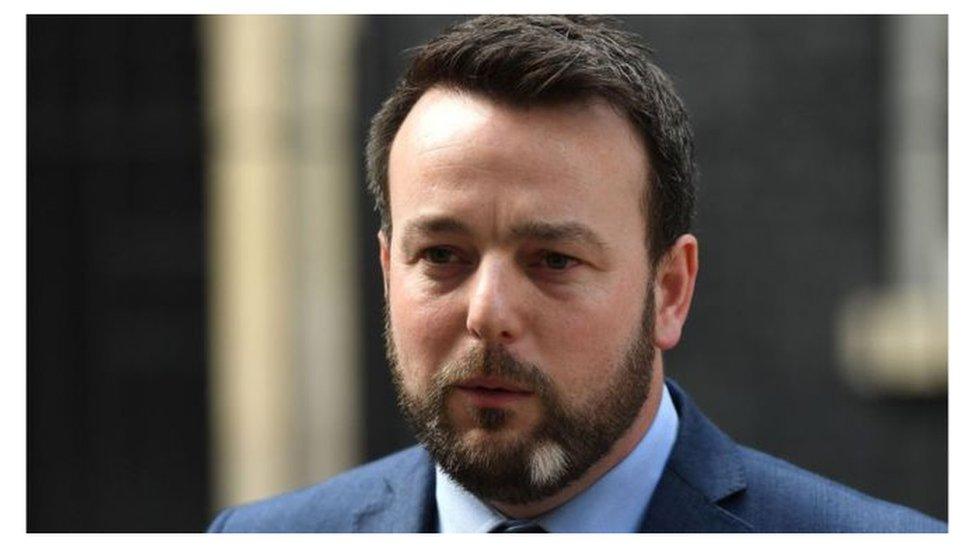Brexit: Foster 'to keep pressure' on PM to scrap NI Protocol
- Published

Mrs Foster said Dublin, Brussels and London had to acknowledge the "damage done" by the protocol
DUP leader Arlene Foster has said she intends to "keep the pressure" on Prime Minister Boris Johnson to scrap Brexit's Northern Ireland Protocol.
She was speaking following more talks between the UK and EU, aimed at resolving concerns over the working of the Irish Sea border.
Afterwards, both sides reaffirmed their commitment to making the protocol work.
But Mrs Foster said Dublin, Brussels and London had to acknowledge the "damage done" by the protocol.
Unionists oppose that part of the Brexit deal, saying it has created barriers between trade from GB to NI and threatens NI's place in the United Kingdom.
A petition by the DUP calling on the government to trigger Article 16 of the Northern Ireland Protocol is to be debated at Westminster on 22 February.
It has gained almost 140,000 signatures so far, said Mrs Foster.
"I think it was an indication of how strongly so many people right across the United Kingdom felt about the issue that that petition took off in the way that it did," she added.
Former first minister weighs in
On Friday, former DUP leader Peter Robinson intervened in the protocol debate, saying unionists face a choice of accepting it or walking away from the power-sharing institutions at Stormont.
Writing in his column for the News Letter newspaper, external, Mr Robinson said that "in truth, you cannot try to ditch the protocol and administer it at the same time".
He asked: "Is the scrapping of the protocol more important than the continued operation of the assembly? A choice may have to be made."
Responding to those comments, Mrs Foster said she thought the article was "very thoughtful".
"I want Stormont to succeed, I want devolution to succeed but there has to be a recognition in London, Dublin and Brussels that damage has been done by this protocol and we have to deal with it," she said.
"We need to make Stormont work because if Stormont wasn't here, if it disappeared in the morning the protocol would probably be emboldened so we to use all of the mechanisms at our disposal just as I'm calling on the prime minister to use the legislative options he has."

Since the new rules came into force there has been tensions at ports in Northern Ireland
Mrs Foster again said that it would be a "dereliction of duty" for Mr Johnson not to act, a point she had made that clear to him in a phone call on Friday.
She said she had also spoken to Mr Robinson about his comments and that he was raising issues she had already raised concerns about.
"I think it is important to hear his voice around these issues... I hope the UK government have read his article today just as I hope they're listening to the voice of David Trimble, and me as first minister, because I am really concerned about where the unionist community is at present."
Former Ulster Unionist leader Mike Nesbitt said the history of unionism showed that "walking away or collapsing leaves unionism with less by the time they get back to the table".
He said Mr Robinson's comments were not helpful."I don't think we should be collapsing Stormont in the middle of a pandemic," he added.

SDLP leader Colum Eastwood said politicians need to stop "rabble-rousing"
Sinn Féin MP Chris Hazzard dismissed Mr Robinson's suggestions as a distraction.
"Collapsing the assembly doesn't scrap the protocol, it is part of an international treaty and was negotiated when the assembly wasn't sitting," he added.
While SDLP leader Colum Eastwood said the only option for politicians was to be "honest" that the protocol needed to remain in place."Let's work through the difficulties and stop rabble-rousing and using inflammatory rhetoric, it will get you nowhere."I'm not sure what walking away from Stormont would achieve - if unionism wants to walk away it would be a huge strategic error."
Checks on goods
The Northern Ireland Protocol was designed to ensure an open border remained on the island of Ireland after Brexit.
But to make it work, the two sides agreed that Northern Ireland would remain in the single market for goods, unlike the rest of the UK.
This meant checks had to be introduced on some goods travelling between Great Britain and Northern Ireland.
Since the new rules came into force, there has been tensions at ports in Northern Ireland, with disruption to some food supplies and online deliveries.
Checks at some ports were temporarily suspended at the beginning of February over "sinister" threats made to some border staff who were carrying out checks on goods.